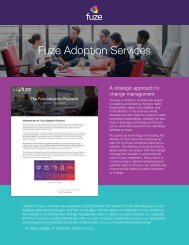Blouse Magazine
Create successful ePaper yourself
Turn your PDF publications into a flip-book with our unique Google optimized e-Paper software.
Do you see having a risk-taking mentality as a barrier to entry for
women who want to join the tech industry?
Women can quickly access the information that they need to kick-start
or fast-track their knowledge and learning. But it’s true that our research
has found that when women are looking at advancing their careers
they can they fall short when applying for a new position, particularly if
they’re coming from a more traditional area of media (the telecommunications
industry, for example) and they’re trying to move in to one that’s
more technologically mediated. And let’s face it – nearly every industry
now requires a lot more technological knowledge.
When looking at a job description, women will go through all of the
requirements and if there are ten things the prospective employer is
looking for, they’ll figure that if they don’t have nine or all ten of those
qualifications that they won’t actually be suitable or qualified for the job.
And so they won’t go for it as often as a man would.
A guy might look at that job description and go “OK so they’re looking
for these ten things, yeah I’m pretty confident about five or six of them,
two of them I can I pick up, I know nothing about two of them but you
know, hey I’ll go for this job.” Whereas a woman might go – “Oh I’m not
so sure. If I can’t go in and show that I can perform in at least nine or
ten of those categories, I’m not going to get hired.”
Why do you think that is?
Women need to feel that they know enough: that they can move into new
areas and be able learn within them, that they’ll be able to learn from
their colleagues and from their experiences, and that they’ll be able to
manage in that atmosphere. Women can begin to relax more and be confident
in their abilities – what they know and what they can learn on their
feet – without thinking that they have to hyper-perform.
We try to teach our students the value of making mistakes and failure.
You can’t succeed without failing. Sometimes you have to fail really big to
actually understand what you need to learn, and how to do that quickly,
so that the next time you’re prepared and ready to take a more qualified
risk. If you don’t have the confidence and the courage to take risks in
your own career you’re not going to get very far.
I think sometimes women feel that they can’t compromise a comfortable
position for one where they’re going to have a lot of anxiety. But we have
to be able to move ourselves over those barriers and out of our comfort
zone. We have to feel the confidence to be able to take those risks and
get the rewards. And have fun with it!
You’re also currently working on your Ph.D. too, is that right?
That’s right, I’ve been chipping away at my Ph.D. for the last five years.
It’s called Eros, Women, and Technology and it’s about how women interact
with technology and the place of the erotic body in technology.
I think the place and importance of the body, and particularly the erotic
body, has been lost in technology. Many women aren’t so willing to make
the trade off between the mind and the body; they want to communicate
without getting themselves lost in their own heads and leaving their bodies
behind.
The Ph.D. is a philosophy degree but based in my field of work, so my
thesis includes things like the history of women artists using personal
technologies such as photography and videography, the history of
women’s education in technology, how women are concerned about their
children’s use of technology, how technology has impacted women’s
lives and bodies in areas such as the now very technologized act of childbirth
and how that affects women’s health. It’s a big topic! It’s probably
a bit too big [laughs]. So at the moment I’m scaling back and refining it,
and pulling it all together.
It’s interesting because it feels like the tech industry is finally beginning
to acknowledge the role of women in technology. Has academia
done a better job at highlighting this topic?
One of my committee members, Jennifer Jenson, and one of my colleagues,
Emma Westecott, are doing a lot of very interesting work on
women and games. And I think there have been a lot of good studies in
this area for quite a while. It’s an important area because it’s a way in.
How many guys do you know who are working in technology found their
way in through a love for video games? Well guess what: video games for
a long time were not that appealing to girls. Some girls love first person
shooters but lots of girls really don’t. They often prefer collaborative and
narrative games. And there aren’t nearly so many of those available, and
very few have been designed by women.
There aren’t many studies on how to get more women into technology,
so I wanted to add my perspective as a woman who has been working
in technology for the last three decades. It’s become clear to me that
things haven’t really progressed, and that it’s not just a bit of a problem
– it has actually become a bit of a crisis.
What was it that drew you into technology? Did you play video games
growing up?
You know what, [laughs] the first video games only began to appear
once I was grown up! I do remember being immediately taken by Space
Invaders, the arcade game; I was addicted to it rather quickly. And it was
interesting because I first played it in the UK, when I was over there with
Martha and the Muffins recording our first album and we all thought,
“Wow, this is fantastic!” They didn’t yet have it over here so we were all
trying to figure out how we could introduce Space Invaders to Canada
[laughs].
But I’d been working with computers a long time before that. I’d been
working with computers since I was about 19.
So you had a start in technology before recording your first album.
Looking back at your career, I had the impression your successes in
music, design and technology were all distinct periods of your life, but
perhaps they were more interwoven than I had imagined.
When I was younger I really wanted to go to art school here at OCAD (it
was the Ontario College of Art at the time), and I needed to make money
to pay for my tuition. I got this funny little job where a woman trained me
to do punch card programming for big mainframe computers. This was
before there were even keyboards and displays. I didn’t know anything
about it, but it had a logic to it that I really liked, and I was not afraid
of it. Once I learned to do basic programming I realize that I enjoyed it,
and I could work independently; I didn’t have to do a 9-5 job, I could
program and do data entry and data analysis in the middle of the night if
I wanted. It was a good job and it put me through art school.
There was something abstract about it, something tangible that I really
liked. I’m not a mathematician (I don’t have that kind of brain), but it
seemed visual and physical, something I could get my hands on. Also,
lots of people didn’t know how to do it, so it felt sort of like a secret and I
felt kind of powerful.
At the Ontario College of Art, I was most interested in working in sound,
video, holography and disciplines that had technology supporting them.
I also did painting and drawing which I had always done, but I wanted
to figure out how to combine them. So I took animation, film and video
editing; I created sound pieces and edited video to them. The great thing
was that in those early days – I’m talking about the late 70s – we had all
of the facilities here at the school. We had some of the very first
synthesizers, which were not keyboard synthesizers but peg-board
synthesizers.
And then I met my pals from the band that I ended up joining, Martha
and the Muffins, and we were all really interested in using new instruments
and experimenting with tape and sound. We were playing with
technology and making abstract sound pieces before we were making
music together.
Was there any kind of precedent in your family of having an aptitude for
technology?
Both my daughters now work in technological fields too, but no, not really.
I mean, I had an artistic and musical family, but you know, this was
before technology was really a thing. I do remember taking one of those
aptitude tests, and for some reason mine said I should be a mechanic
[laughs]. I always did like making things, taking things apart and putting
them back together.
30 | Blouse Technology Issue






